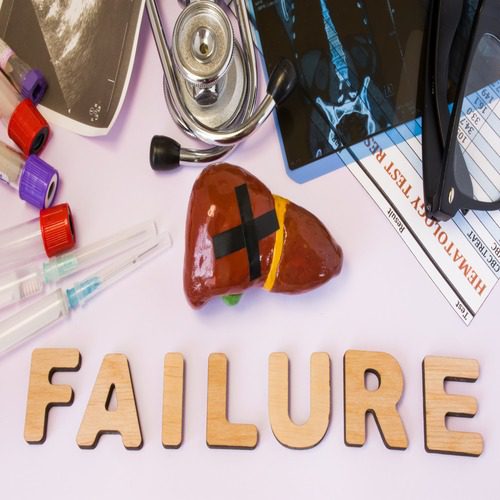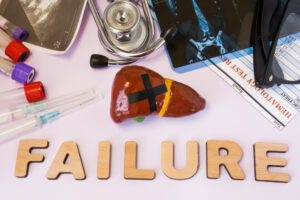Cystitis in Men : What Is It and Who Can Get It?
Cystitis is a common urinary tract infection (UTI) that primarily affects women, but it can also occur in men. Although …
Read More

Liver failure is a critical medical condition that occurs when the liver cannot perform its essential functions, resulting in serious health implications. As the largest internal organ, the liver plays a vital role in various metabolic processes. These processes include detoxification, protein synthesis, and bile production for digestion. Liver failure can manifest as acute or chronic and is life-threatening if left untreated. This comprehensive article aims to provide an in-depth understanding of the causes, symptoms, complications, diagnosis, treatment options, and prevention strategies related to liver failure.
Liver failure can be caused by various factors, including:
Chronic Alcohol Abuse:
Excessive and long-term alcohol consumption is a significant cause of liver failure. Alcohol-related liver disease progresses through different stages, starting with alcoholic fatty liver, leading to alcoholic hepatitis, and ultimately resulting in cirrhosis. This is a major risk factor for liver failure.
Viral Infections: Viral hepatitis, particularly hepatitis B and C, can cause liver inflammation and damage, potentially leading to liver failure if left untreated. These viruses are commonly transmitted through contaminated blood, sexual contact, or from mother to child during childbirth.
Non-Alcoholic Fatty Liver Disease (NAFLD): NAFLD is a condition characterized by the accumulation of fat in the liver, primarily associated with obesity, insulin resistance, and metabolic syndrome. If not properly managed, NAFLD can progress to non-alcoholic steatohepatitis (NASH) and eventually lead to liver failure.
Autoimmune Hepatitis: In autoimmune hepatitis, the immune system mistakenly attacks healthy liver cells, resulting in inflammation and damage. If left untreated, this condition can progress to liver failure.
Genetic and Inherited Disorders: Certain genetic conditions, such as hemochromatosis (excess iron accumulation), Wilson’s disease (copper accumulation), alpha-1 antitrypsin deficiency, and others, can lead to liver failure. These disorders affect liver function and cause progressive liver damage over time.
Drug-Induced Liver Injury: Certain medications, including over-the-counter drugs, prescription medications, and herbal supplements, can cause liver damage if used improperly or in high doses. Drug-induced liver injury can lead to acute liver failure in some cases.
Liver failure symptoms can vary depending on the stage and severity of the condition. Common symptoms include:
Fatigue and weakness: Feelings of extreme tiredness and weakness, often persistent.
Jaundice: Yellowing of the skin and eyes due to bilirubin buildup.
Abdominal pain and swelling: Pain and swelling in the abdominal area.
Easy bruising and bleeding: Increased vulnerability to bruising and prolonged bleeding due to decreased production of blood clotting factors.
Nausea and vomiting: Persistent nausea and vomiting.
Loss of appetite and weight loss: Reduced appetite leads to unintended weight loss.
Mental confusion and cognitive impairment: Impaired cognitive function, confusion, and difficulty concentrating.
Fluid retention and swelling: Accumulation of fluid in the legs (edema) and abdomen (ascites).
Hepatic encephalopathy: Mental confusion, altered behavior, and cognitive impairment due to the liver’s inability to remove toxins effectively.
Ascites: Accumulation of fluid in the abdominal cavity, leading to abdominal swelling and discomfort.
Portal hypertension: Increased pressure in the portal vein, causing blood to back up into other organs, such as the spleen and intestines.
Gastrointestinal bleeding: Portal hypertension can lead to varices (enlarged blood vessels) in the digestive tract, increasing internal bleeding risk.
Kidney dysfunction: Liver failure can affect kidney function, leading to renal impairment and complications such as fluid retention and electrolyte imbalances.
Increased susceptibility to infections: Liver failure weakens the immune system, making individuals more prone to infections.
Medical history assessment: Evaluating risk factors, alcohol consumption, and potential exposure to hepatitis viruses.
Physical examination: Assessing signs such as jaundice, abdominal tenderness, and fluid retention.
Blood tests: Measuring liver function tests, including liver enzyme levels, bilirubin, albumin, and coagulation factors. Viral hepatitis markers, such as hepatitis B surface antigen (HBsAg) and hepatitis C antibodies, are also tested.
Imaging tests: Ultrasound, computed tomography (CT), or magnetic resonance imaging (MRI) scans may be performed to visualize the liver’s structure and detect any abnormalities.
Liver biopsy: A small sample of liver tissue may be obtained for microscopic examination, which can help determine the extent of liver damage and identify the underlying cause.

Treatment of liver failure aims to manage symptoms, address complications, and, in severe cases, consider liver transplantation. The specific treatment approach depends on the underlying cause, the severity of the condition, and the patient’s overall health.
Medications:
Symptom management: Medications may be prescribed to alleviate specific liver failure symptoms. For example, diuretics can reduce fluid retention, while anti-emetics relieve nausea and vomiting.
Hepatic encephalopathy: Lactulose and other medications may be prescribed to reduce toxins buildup and manage cognitive impairment.
Antiviral therapy: In cases of viral hepatitis, antiviral medications are administered to suppress viral replication and reduce liver inflammation.
Dietary modifications:
Sodium restriction: Limiting sodium intake helps manage fluid retention and prevents the worsening of ascites.
Protein restriction: In cases of hepatic encephalopathy, a controlled protein intake may be recommended to reduce ammonia production.
Balanced nutrition: A well-balanced diet, rich in fruits, vegetables, whole grains, and lean proteins, is essential for overall liver health and healing.
Lifestyle changes:
Alcohol cessation: Completely abstaining from alcohol is crucial in alcoholic liver disease to prevent further liver damage and halt disease progression.
Weight management: For individuals with non-alcoholic fatty liver disease (NAFLD), weight loss through a combination of a healthy diet and regular exercise is recommended to reduce fat accumulation in the liver.
Smoking cessation: Smoking can worsen liver damage and impair treatment effectiveness, so quitting smoking is highly beneficial.
Liver transplantation:
Liver transplantation may be considered in cases of irreversible liver damage and end-stage liver failure. It involves surgically replacing the diseased liver with a healthy liver from a deceased or living donor. Liver transplantation provides a chance of survival and an improved quality of life.
Preventing liver failure involves adopting certain lifestyle changes and taking proactive measures to safeguard liver health. Here are some preventative strategies.
Limit alcohol consumption:
Moderate or eliminate alcohol consumption to reduce alcoholic liver disease and liver failure. For those with a history of alcohol abuse, seeking professional help and support groups can be beneficial.
Vaccination:
Immunize yourself against hepatitis A and B to reduce viral hepatitis risk. Vaccination is particularly critical for individuals at high risk, including healthcare workers, individuals with multiple sexual partners, and those who inject drugs.
Practice Safe Sex and Needle Safety:
Engage in safe sexual practices and use barrier methods, such as condoms, to prevent hepatitis virus transmission.
Avoid sharing needles, syringes, or other drug paraphernalia to prevent viral hepatitis and other blood-borne infections.
Maintain a healthy weight:
Adopt a healthy lifestyle that includes a balanced diet and regular physical activity to prevent obesity and reduce the risk of non-alcoholic fatty liver disease (NAFLD). Aim for a body mass index (BMI) within the healthy range.
Medication awareness:
Use medications responsibly and as prescribed by healthcare professionals. Be cautious about potential liver toxicity and follow the recommended dosage guidelines. Inform your healthcare provider about all medications, including over-the-counter drugs and herbal supplements, to avoid potential interactions and liver damage.
Regular medical check-ups:
Schedule regular check-ups with your healthcare provider to monitor liver health and detect early signs of liver disease. Routine blood tests and liver function tests can help identify potential issues.
All in all, liver failure is a complex and potentially life-threatening condition that demands our attention and understanding. By delving into the causes, symptoms, complications, diagnosis, treatment options, and prevention strategies related to liver failure, we have gained valuable insights into this critical medical condition.
as a vital organ, performs numerous essential functions in the body. Therefore, any impairment or failure of its functionality can have severe consequences. Chronic alcohol abuse, viral infections, non-alcoholic fatty liver disease, autoimmune hepatitis, genetic disorders, and drug-induced liver injury are among the primary causes of liver failure. Recognizing these causes is crucial for early intervention and effective treatment.
Liver failure symptoms, such as fatigue, jaundice, abdominal pain, mental confusion, and fluid retention, indicate urgent medical attention. Early diagnosis through medical history assessment, physical examination, blood tests, imaging techniques, and liver biopsy can help determine the extent of liver damage and identify the underlying cause.
Medications, dietary modifications, lifestyle changes, and, in severe cases, liver transplantation offer avenues for symptom management, complications prevention, and improved quality of life.
Preventing liver failure requires proactive action. Limiting alcohol consumption, practicing safe sexuality, maintaining a healthy weight, using medications responsibly, and seeking regular medical check-ups are vital preventative measures.
By prioritizing liver health and taking the necessary precautions, we can reduce liver failure and promote overall well-being. It is crucial to spread awareness about liver health, encourage healthy lifestyle choices, and ensure access to proper healthcare resources for early detection and intervention.
Remember, the liver is a remarkable organ with regenerative capabilities. By nurturing and protecting it, we can safeguard our well-being and enjoy a healthy life.
“Always polite and delivers medication on time. Absolutely love the service they provide and great staff. Keep up the good work ????”
“A fantastic pharmacy. Efficient, helpful staff who deliver within a few hours of prescription being prescribed or less. Absolutely amazing service.”
“Can highly recommend this service, the delivery is so speedy and always reliable, delivered by hand to the door, just amazing, thank you.”
Cystitis is a common urinary tract infection (UTI) that primarily affects women, but it can also occur in men. Although …
Read MoreIntroduction: Unveiling the Mysteries of Soma Soma medication, also known as carisoprodol, is a muscle relaxant commonly prescribed to alleviate …
Read MoreUnderstanding Ramipril and Its Role in Health Ramipril, a medication commonly prescribed for high blood pressure and heart failure, belongs …
Read MoreClick one of our contacts below to chat on WhatsApp